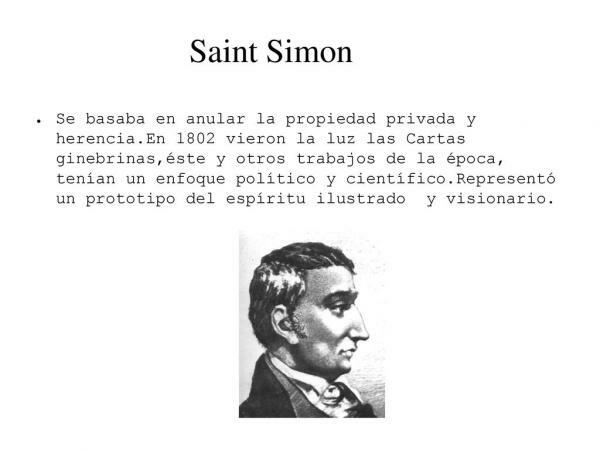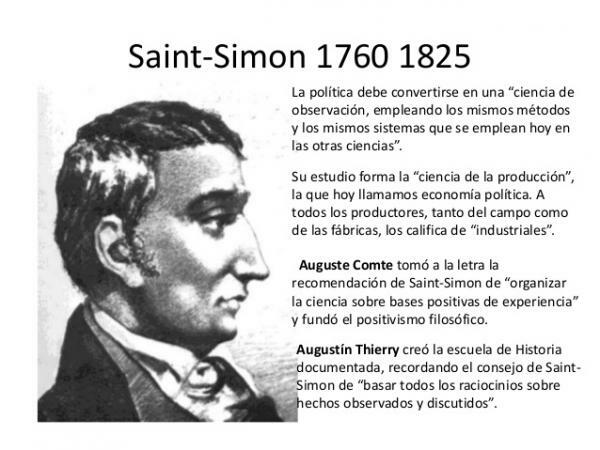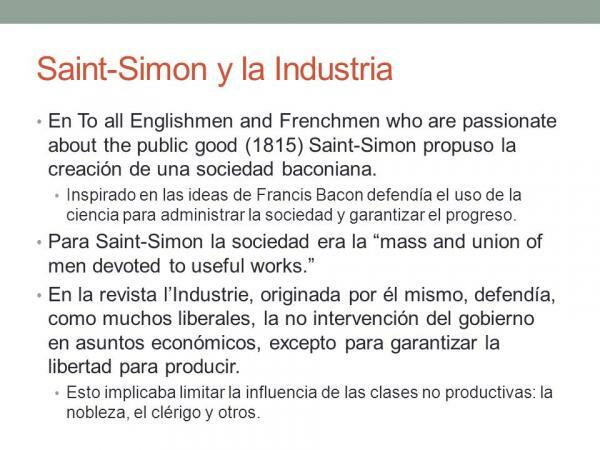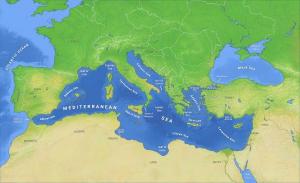Main WORKS of SAINT-SIMON

In this lesson from a TEACHER we offer you a brief summary of the Saint-Simon's main works, positivist philosopher and socialist theorist who, with his works, directly influences the socio-economic policy of his time and sets the course for the philosophy of science. His ideology is called "Saint-Simonism" and he defends a new positive organization of the state, with the construction of a new industrial society, led by scientists and artists. Likewise, Saint-Simon assures that the study of society has to be done in a scientific way ("social physiology").
If you want to know the Saint-Simon works more important, the father of socialism, positivism and sociology, as well as technocracy, keep reading this article by a PROFESSOR.
Index
- Geneva letters, a fundamental work of Saint-Simon
- Reorganization of European society
- The catechism of industrialists
- La Industria: the magazine of positivist philosophy
- The New Christianity: Summary of Saint-Simon's Main Ideas
Genevan Letters, a fundamental work of Saint-Simon.
One of Saint-Simon's most important works is Geneva letters. Published in 1802, this representative of positivist philosophy exposes some of his most important ideas:
- All men have to work
- The French Revolution is a class struggle
- The dispossessed have given rise to the rule of terror
- Scientists must take the place of priests
Saint-Simon ensures that the application of principle of equality, consequence of the French Revolution, did not have the expected success, since the government was occupied by incompetent, and besides, they were many and had to be paid, so, finally, instead of lowering taxes for the most poor, they went up.

Reorganization of European society.
Saint-Simon wrote this work in 1814 together with Augustin Thierry, which includes a transformation project society with a very original proposal: that they were the scientists those who put themselves in command, and thus influence, both in society, as in the economy, and in the industry.
It is possible to observe in Saint-Simon, a antecedent of Europeanism by proposing the constitution of a federated Europe through institutions in order to progress at all levels; some ideas very well accepted by liberals.

The catechism of industrialists.
His ideas in relation to the industry lead Saint-Simon to conceive a Socialist state and this project is reflected in works such as The organizer, from the year 1819; From the industrial system, published between 1821 and 1820; Y The catechism of industrialists, which saw the light in the year 1823.
Saint-Simon defends the private property only when it is the fruit of work, therefore, modern societies are based on the industry of which "the growers, manufacturers and traders ”, who work to produce everything that society needs for the satisfaction of its needs.
“… Together they work to produce or to make available to all members of society all the material means to satisfy their needs or their tastes fí
La Industria: the magazine of positivist philosophy.
Saint-Simon publishes this magazine together with Auguste Comte Y Augustin Thierry, under the following slogan "theard by the industry, everything for her”, Since it is the only guarantee of society, the origin of its wealth and its progress.
In this post, they advocate a "earthly morality"in line with positive science, because politics is the science of producing and this has to be included in the economy. Therefore, the economy is the basis of politics, which must direct the production processes. Engels, assures that here is the germ of the suppression of the State.
Although at first Saint-Simon was more liberal, tinges can be seen in his later works anti-liberallists by stating that:
"People do not associate to be free (because) true freedom will have to be understood in relation to a greater development of material and intellectual possibilities."
The end of the social contract is not individual freedoms, but the peace of all individuals

The New Christianity: Summary of Saint-Simon's Main Ideas.
We finish this review of Saint-Simon's works to talk about this publication where he offers a synthesis of all your ideas. It was published the same year he died, 1825, and is his most socialist by affirming that the aim of all his work is the emancipation of the working class. Of his earlier works, he says, they were:
“a simple glorification of modern bourgeois society against feudal society, that is, of the industrialists and bankers against the marshals and legal makers of laws of the time napoleonic”.
The new social christianity Saint-Simon it tries to take the place of selfish and "idle" Christianity, which goes against the interests of society.
“The great earthly goal of Christians, who must set themselves to obtain eternal life, is to improve as quickly as possible the moral and physical existence of the poorest class”, Assures the thinker in his last work.
“The New Christianity will have been purged of all the heresies that currently exist; new Christians will regard moral doctrine as the most important element of their religion; [...] Religion must direct society towards the general objective of the quickest possible improvement of the condition of the poorer class ”.
In his work the dialectic between the capitalist and the worker typical of socialism is not appreciated, since he considers that the former will direct production in such a way that the entire society benefit.
Gian mario bravo states that Saint-Simon:
“He was not a utopian, unlike Fourier, who sometimes made concessions to a utopian representation of society. His vision of the future even offered a typically anti-utopian, science-based analysis that he intended to give an industrial frame to all social construction, and that today could be crossed out of vision technocratic”.
If you want to read more articles similar to Saint-Simon: main works, we recommend that you enter our category of Philosophy.
Bibliography
- Saint- Simon. Reorganization of European society. Ed. Fine Arts School. 2012
- Saint- Simon. The catechism of industrialists. Ed. Orbis. 2012
- Saint- Simon. The new christianity. Ed. Biblos. 2004



